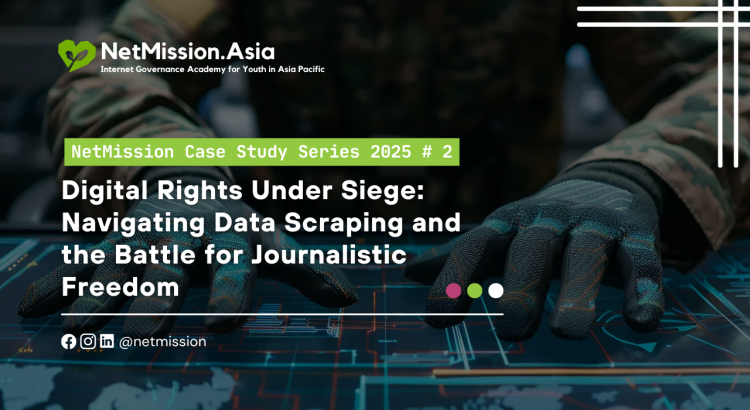
Kurdish Women Journalists Who Work Under Constant Threat Have Lessons to Share
March 8, 2025
A journalist’s killing, a restless metropolis & the ideological divide
March 16, 2025March 11, 2025 – Source: Net Mission –
Human rights online encompasses digital freedom that protects individuals’ privacy, expression, and access to information in a connected world. These rights are crucial for ensuring democratic participation and safeguarding personal dignity while exercising fundamental rights. Recently, numerous human rights violations have emerged, from unauthorized data scraping by AI companies to systematic harassment of journalists, threatening both privacy and press freedom. To this effect, in this case study, we will be highlighting the rising concerns of surveillance capitalism and authoritarianism worldwide to reveal the urgent need for comprehensive digital rights protection in our society.
Case 1 – Data Scraping: When AI Companies Steal Your Data for the ‘Greater Good’
Background
Data scraping has been used for research purposes for many years now and has become an essential technique in AI development too, allowing companies to extract vast amounts of data from websites to train their Large language models (LLMs). This process is widely used in natural language processing, image recognition, and content generation. However, data scraping has sparked controversy due to privacy concerns, intellectual property violations, and other ethical dilemmas. Many AI companies scrape publicly available information without seeking user consent, leading to legal disputes and calls for stricter regulations. While data scraping has contributed significantly to AI advancements, its potential to exploit personal data and copyrighted content raises serious concerns about digital rights and ownership.
Data Scraping and Its Ethical Concerns
Data scraping involves using automated tools to collect information from the Internet, often without the knowledge or consent of the data owners. AI companies rely on this practice to build large datasets, but many websites prohibit scraping in their terms of service such as X (previously Twitter). Ethical concerns arise when personal data, artworks, and copyrighted materials are scraped without permission, raising questions about privacy, transparency, and fairness. Additionally, the use of scraped data in AI-generated content can harm creators by devaluing their work and allowing AI systems to replicate human efforts without proper acknowledgment. The lack of clear ethical guidelines and oversight further exacerbates the problem.
Human Rights Violations
Unregulated data scraping can lead to severe human rights violations, particularly regarding privacy, surveillance, and discrimination. Social media platforms and other online sources contain personal information that, when scraped and misused, can expose individuals to identity theft, harassment, and wrongful profiling. Facial recognition companies, for example, have used scraped images without consent to create databases that governments and private organizations often use for surveillance, leading to biased and discriminatory practices. Furthermore, AI-generated misinformation and deepfake content, trained on scraped data, can manipulate public opinion and spread false narratives, posing risks to democracy, security, and personal freedom. Most importantly, the scraped data may contain biased content like hate speech, disinformation etc. which will be reproduced by AI systems to stem systemic biases.
Different Lawsuits and Notable Incidents
Several lawsuits have been filed against AI companies for unauthorized data scraping.
- In Andersen et al. v. Stability AI, artists sued Stability AI, Midjourney, and DeviantArt for using their artwork without permission to train AI models. Authors Guild v. OpenAI involved authors such as George R.R. Martin and John Grisham taking legal action against OpenAI for allegedly using their copyrighted books without consent.
- Additionally, Doe v. GitHub highlighted software developers’ concerns about GitHub Co-pilot scraping their publicly available code without proper attribution.
Beyond lawsuits, incidents like the Cambridge Analytica scandal and Clearview AI’s facial recognition practices have demonstrated the dangers of unethical data scraping. Most of these companies are based in the US, which makes it harder for people from other jurisdictions to raise their concerns.
Possible Solutions and Strategies
To mitigate the ethical and legal challenges of data scraping, companies and governments must adopt stricter regulations and responsible data collection practices. AI firms should prioritize employing legally obtained and ethically sourced datasets, ensuring transparency in how data is collected and used. Additionally, stricter laws, such as requiring explicit consent from data owners and enforcing penalties for violations, can help protect individual rights. Lastly, anti-scraping technologies and user privacy tools can prevent unauthorized data extraction (like Glaze). To encapsulate, collaborative efforts between policymakers, technology companies, and digital rights organizations will be pivotal in creating a fair and ethical approach to AI development while safeguarding user privacy and intellectual property rights.
Case 2 – Silencing the Truth: The Battle for Journalists’ Rights in the Digital Age
Background
The digital age has transformed journalism, enabling real-time global communication and unrestricted access to information. However, this shift has also exposed journalists to new threats, including online harassment, surveillance, censorship, and legal persecution, all of which jeopardize press freedom. Governments and powerful entities increasingly exploit digital tools to silence dissent, control narratives, and suppress independent journalism, violating fundamental human rights. These challenges not only endanger individual journalists but also threaten democratic values and limit public access to accurate, unbiased information. Addressing these issues requires stronger legal protections, enhanced digital security measures, and international collaboration to safeguard journalists’ rights and uphold freedom of expression in the digital era.
Why Do Journalists’ Voices Matter in the Online Space?
A free press is essential for democracy, ensuring transparency and accountability by providing/supplying the public with accurate, diverse, and timely information. Journalists serve as watchdogs, exposing corruption, human rights violations, and abuses of power. However, in many countries, digital platforms have become battlegrounds where press freedom is increasingly restricted through censorship, online harassment, and government surveillance. When journalists are silenced, misinformation spreads, and the public loses access to unbiased news. In the digital space, safeguarding press freedom is crucial to uphold democracy, protect human rights, and ensure informed public discourse.
Human Rights Violations Against Journalists
Journalists worldwide face increasing digital threats that undermine their ability to report freely. For instance in Hong Kong, the forced closure of media outlets like Apple Daily and Stand News highlights government censorship and the suppression of independent journalism following the 2020 National Security Law. On the other hand in India and Pakistan, journalists are subjected to extensive surveillance, including the use of spyware like Pegasus, which invades their privacy and restricts their ability to communicate securely. Women journalists in Pakistan, such as Asma Shirazi, face gender-based online harassment, including cyberbullying and doxxing, aimed at silencing their voices. Legal persecution is another major threat, as seen in India, where journalists are frequently arrested under repressive laws like the Unlawful Activities Prevention Act (UAPA), which enables prolonged detention without trial. Additionally, physical violence against journalists, including fatal attacks, has been on the rise, further threatening press freedom and discouraging investigative reporting.
Government Responses and Their Implications
Governments often justify press restrictions under the guise of national security, public order, or counterterrorism. However, these measures frequently serve as tools for silencing opposition and suppressing investigative journalism. In some cases, governments pressure social media companies to remove critical content or restrict the accounts of independent journalists. While some international organizations, such as the United Nations and Amnesty International, have condemned these practices, highlighting defects in enforcement mechanisms. In the absence of stronger global pressure and legal safeguards, authoritarian regimes will continue to exploit digital platforms to suppress press freedom.
Possible Solutions and Strategies
Protecting journalists in the digital space requires a multi-faceted approach. Governments must establish and enforce legal protections for press freedom while repealing restrictive laws that criminalize journalism. International organizations should analyze, evaluate and monitor accountable mechanisms for press freedom violations. Media organizations need to provide journalists with digital security training, equipping them with tools like encrypted communication, secure email, and VPNs to mitigate surveillance risks. Social media platforms and tech companies must implement stronger content moderation policies to prevent government misuse while ensuring transparency in their decision-making processes. To mitigate these issues, collaboration between journalists, human rights groups, and digital rights advocates is essential for creating a safer environment to ensure press freedom.
Conclusion
Online human rights challenges demand urgent attention as both data scraping and suppression of journalistic voices undermine digital freedom. These case studies reveal how unauthorized extraction of personal and creative content by AI companies as well as systemic harassment of journalists erode privacy, freedom of expression, and public trust. Addressing these issues requires coordinated efforts by governments, private actors, and civil society to enforce stronger legal protections, ethical guidelines, and transparency measures. By safeguarding digital rights, we can ensure that innovation and free expression thrive while protecting individuals from exploitation and abuse in the online realm for a better future where no one is left behind.
Digital Rights Under Siege: Navigating Data Scraping and the Battle for Journalistic Freedom

